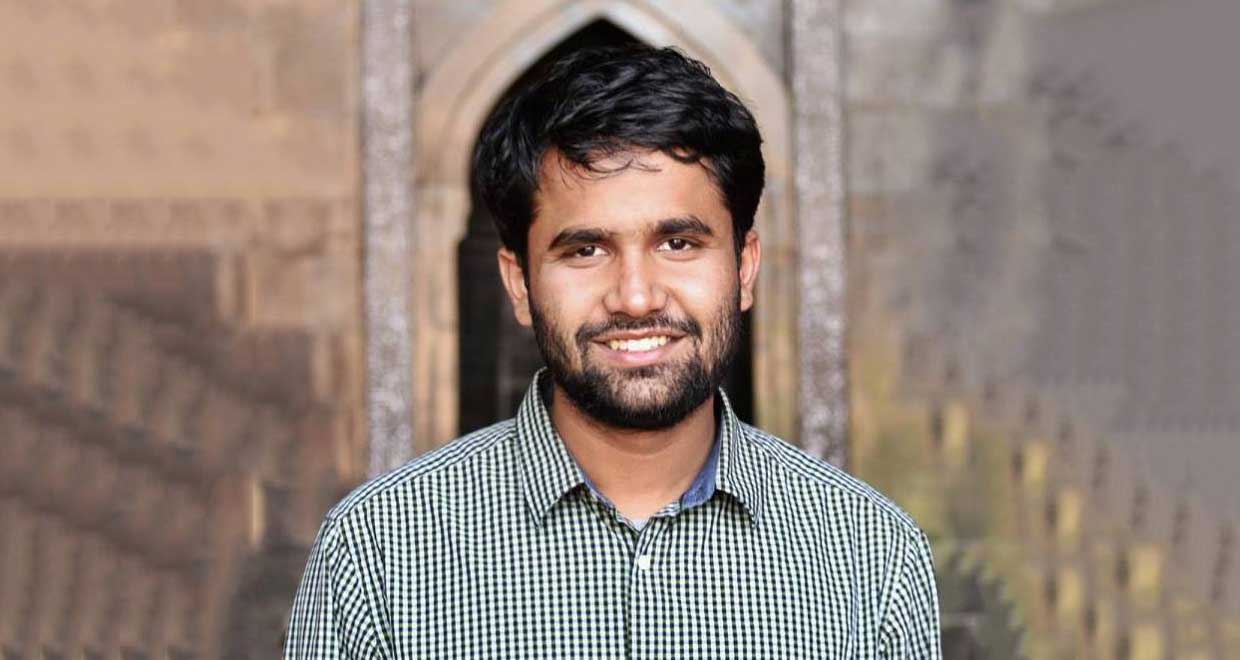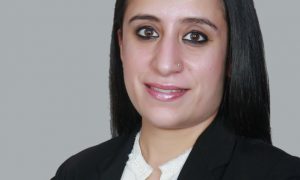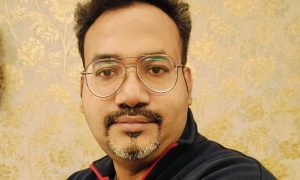Abdaal Akhtar graduated from NALSAR, Hyderabad, in 2013. He has previously worked with ITC, Calcutta. He had attempted the UPSC exam twice, and this year with an all India rank of 35 he made it to the IAS. He is currently undergoing the Foundation Course at Lal Bahadur Shastri National Academy of Administration, Mussoorie.
In this interview he talks about:
- His years in college, and working on a passion for quizzing.
- Working in ITC, Calcutta as an in house counsel.
- Cracking the UPSC exam.
- Experience at Lal Bahadur Shastri National Academy of Administration, Mussoorie.
Given that most of our readers are law students and young lawyers, how will you introduce yourself to them? Do you come from a family of lawyers?
I was the first lawyer in my family. My father is a Civil Servant who works for the Indian Railways and my mother is a homemaker. Taking up law, that too in 2007, was a rather unconventional choice. This was more so since I then lived in Hyderabad where Engineering and Medicine ruled the roost as preferred career options. However my parents had heard of the National Law Schools and were very supportive of my decision.
What was it that got you interested in the legal field? How did you prepare to get into NALSAR? Was it rigorous preparation or was some luck involved?
There was no single incident as such. Probably some of it had to do with my dislike of Math and Science. But I always had a deep interest in politics, current affairs and modern Indian history. I do not think there is any other field apart from Law that so beautifully marries these areas. Credit must also go to the erstwhile LST. Their website, and the peer group they introduced me to, went a long way in making me aware of law as a career, the various choices that I could pursue in Law School and also assuaged any lingering concerns that I had. My preparation was hardly rigorous. I was studying Political Science in Class 12th and that covered a lot of the Polity syllabus for CLAT. My GK has always been good-largely due to the excellent quizzing environment in Hyderabad. So it is fair to say I approached CLAT with a strong base. Of course there had to be a large dollop of luck involved since I had not bothered to apply elsewhere.
Please do share with us some memories from your five years in college. Did you participate in extra curricular activities?
The five years at NALSAR were not only the best years of my life but also fundamentally changed me as a person. It introduced me to a range of ideas, opinions and people and taught me to respect opposing points of view. I was again very lucky as far as my friends circle was concerned-all extremely bright, well read and smart individuals who helped me grow as a person. Law School was also a lot of fun-dhaba trips, mass bunks, quizzes and the good times from the hostel. Some of it had to do with the fact that NALSAR is a self-contained eco system far away from Hyderabad-so at some level you get to know your college mates much better. Quizzes were the only extra curricular activity I participated in and a couple of us went to great lengths to take part in whatever quizzes were being held in the city.
What according to you can make law students more interested in studying constitutional law and public policy in comparison to, the much sought after, corporate law?
Constitutional Law and Public Policy are not subjects that you can force somebody to develop an interest in. I do tend to think, and I may be wrong, that if you have chosen Law for the right reasons, a fascination with these two subjects is a given. As lawyers, we all read the Constitution but few tend to appreciate the beauty of this document that, to quote Granville Austin, is the ‘cornerstone of a nation’. It offers none of the monetary incentives that taking commercial law courses can, but one must realise that if he/she intends to make a career in public life or litigation, a thorough knowledge of the Constitution is an absolute must.
Did you ever take part in moots or indulge in academic legal writing? Do you feel these are activities that should be left to the discretion of students or something that students should partake in mandatorily as well?
The great advantage of Law School is that it opens multiple doors for you. You can do absolutely anything-from activism to entrepreneurship; and Law School would equip you for it. This is because learning the Law makes you a generally better informed and smarter person. I would not wish to circumscribe this freedom by making legal writing or moots compulsory. This will only worsen the pressure that the sometimes overly competitive law school peer group engenders. For instance, moots never held any interest for me and I stayed clear of them throughout college. Yet, I have seen plenty of my friends becoming better lawyers (or law finders) just by participating in moots regularly. So to each their own.
Were you interested in quizzing from school itself? Or was it something that developed in law school? What advice would you give our readers, to follow the love for quizzing?
Quizzing was something I took up in school and continued throughout Law School. Quizzing is fun, informative and doesn’t make too many demands on your time. NALSAR has a very active quizzing culture and my juniors have left us far behind in the field. I am sure all law students can take a Sunday off every month and attend any of the quiz clubs in their cities. It would be totally worth it.
You’ve had a wide variety of internships during your time as a college student. Do tell us about the places you’ve interned at and whether these were all planned or happened on the go?
I had absolutely no guidance regarding internships. So I picked whatever I could-mostly to explore different facets of the profession. I especially remember my internship with Mr Raju Ramachandran, Sr Advocate, with great fondness. He treated me just like he would treat one of his own juniors. He was kind to a fault and liberal with his time. For a third year student, it was the best initiation into the world of litigation.
After graduating from NALSAR you had worked with ITC Ltd in Calcutta. How did the appointment take place? How helpful do you think a CGPA is to get recruited?
I had interned at ITC during my fourth year, liked what they did and applied for a job there largely because everybody else was taking part in the Placements process too. While my CGPA did play a role, ITC has an intensive recruitment process that comprises of a written test to check your basics in Law followed by an Interview.
Could you please elaborate on the experience of practicing litigation in the High Court and District Courts, during your tenure with ITC?
ITC’s in-house Legal Department is one of the best in the country as far as exposure is concerned. In litigation, for instance, we were involved in the entire process right from the cause of action to briefing the senior counsels. The bosses expect you to shoulder responsibility, take initiative and largely give you the freedom to choose your course of action. It was baptism by fire and I am thankful for it. It taught me more law than I probably learned in five years of college.
How was the work environment at ITC? What prompted you to quit in 2014?
I thoroughly enjoyed my stint with ITC. If I resigned, it was only because Civil Services was a long cherished ambition and one that would just pass by if I did not devote my full time and attention to it. My parents did have some reservations as I was leaving an excellent job but again they came around when they saw that I was insistent on giving a serious shot at the Civil Services Exam. I reckoned that if I were to have any regrets a decade down the line, they better be about the fact that I tried and failed at what I wanted to, rather than that I never even tried.
You attempted UPSC twice. What was the routine you followed everyday till you cracked the exam? How long did you spend preparing for it?
I had my first shot at UPSC while working full time at ITC. The fact that I could make it to the Railways without any serious preparation emboldened me to give another, better prepared shot at it. I resigned and moved to Delhi as my father is posted there. In the five months that followed, I spent no more than 4-5 hours daily preparing for the exam. I must add a note of caution that I could make it with this amount of preparation only because I had a strong base in GK from regular newspaper reading. I did not feel the need to join any coaching institution. A large part of the UPSC General Studies syllabus is nothing but basic Constitutional law that college had already equipped me for. The rest of it was easily managed through regular self study over half a year.
What did you do to keep yourself abreast of all domestic and international current affairs? How did you study for static GK?
There is no better source than newspapers and the Internet for current affairs. An Indian Express or a Hindu is an absolute must. Some people make notes. I did not. You have to choose your own approach. Static GK is best done from NCERTs and certain standard textbooks. I must add that a regular reading habit also helps your immeasurably. It does not matter what you read, as long as you do.
Lakhs of people attempt the UPSC prelims and only a thousand get selected for the main written exam. Which are the prime skills and expertise required to crack the prelims?
A broad and eclectic reading habit is the surest guide to cracking the Prelims. This is not something that can be mastered in a few months and only comes with a genuine interest in the broader world around you. One must be updated with the important events happening both in India and abroad-a task that the Internet makes very easy.
What made you pick IAS over the other service such as IFS, IRS or IPS? How do you want to serve the nation?
The IAS is the supreme generalist service. It expects you to become a Master of all Trades. Thus the challenges it throws up are varied and never ending. I thought it would be an exciting way to spend the next three decades of my life. This takes nothing away from the specialization that an IFS or IPS career expects. These two approaches have their own merits and drawbacks. Serving the nation is a misleading term. As Pt Nehru said in his Tryst with Destiny speech, the service of India is actually the service of her hungry and poor millions. That should be the primary motive of anybody aiming for a career in the Civil Services. If you cannot take the rigours of serving in the remotest corners of the country, trying to make sure that the Government’s welfare schemes benefit those they were intended for, then this career is not for you. Honesty, integrity and strength of character are today much abused and frequently bandied about terms, but one must attempt to live these ideals every day during his/her time in the Civil Services.
Where is your training for IAS being held? What is the duration? Do give us some insight on the experience so far.
As a probationer in the IAS, I am currently undergoing the Foundation Course common to All India and Central Services at Lal Bahadur Shastri National Academy of Administration, Mussoorie. This is a four month long course that seeks to expose you to certain basics of law, economics and political science that are a must for all Civil Servants. It also seeks to build your character and expose you to varied influences through regular treks, group activities, cultural events, village visits and lectures by eminent personalities. It is an extremely hectic yet rewarding time of any Probationer’s career.
Do you think law students might have an edge while preparing for the UPSC exam?
Law students have a great edge while preparing for the UPSC. As I have already mentioned, close to half of the GS syllabus is nothing but basic Constitutional Law. The ability to think logically, write crisply and present multiple sides of an issue are some other traits that lawyers cultivate and UPSC rewards in its exams.
What would be your message to law students and lawyers who aspire to become a civil servant?
The Civil Services as a career is extremely challenging. You have to balance your personal and professional lives with the onerous duties that are placed on your shoulders. You are accountable not to a mere boss but to the people of India. Your indiscretions and mistakes will not lead to a mere delayed promotion but will have real, lasting consequences on the lives of millions. The pay is enough for a comfortable living but is obviously nothing compared to what commercial law firms pay. So do keep these factors in mind when you decide to take the plunge. As I have already mentioned, there is only one good reason to take this up-a genuine desire to serve your country and its people with Constitutional values as your sole guide. If your reasons are different, then you will never be able to see the rewarding side of being a public servant.


























